New Delhi – Congress Member of Parliament Shashi Tharoor delivered a comprehensive analysis of India-Pakistan relations during his recent address at the Council of Foreign Relations in Washington, DC. Shashi Tharoor on Pakistan presented a clear perspective on why international mediation between the two nations remains fundamentally flawed and unworkable in the current geopolitical context.
Speaking to an audience of foreign policy experts and diplomats, Shashi Tharoor on Pakistan emphasized that mediation implies an equivalence that simply does not exist between the two South Asian neighbors. His detailed explanation highlighted the structural differences that make traditional diplomatic mediation approaches ineffective when dealing with India-Pakistan relations.
Fundamental Inequality Between Nations
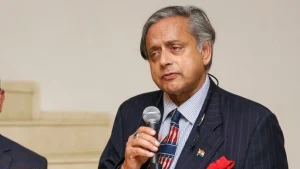
The central argument presented by Shashi Tharoor on Pakistan focused on the inherent inequality between the two countries in terms of their international behavior and domestic governance structures. He explained that mediation traditionally requires some form of equivalence between parties, which is absent in the India-Pakistan dynamic.
Shashi Tharoor on Pakistan articulated that India represents a status quo power that seeks to maintain existing geopolitical arrangements and pursue peaceful development. In contrast, his analysis of Pakistan characterized it as a revisionist power actively working to disrupt established international norms and regional stability through various means including support for non-state actors.
Pakistan as Revisionist Power
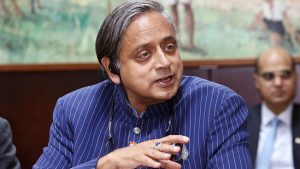

The comprehensive analysis provided by Shashi Tharoor on Pakistan identified the country as fundamentally revisionist in its approach to regional geopolitics. This characterization stems from Pakistan’s alleged attempts to alter existing territorial arrangements and challenge established international boundaries through unconventional means.
According to Shashi Tharoor on Pakistan, this revisionist nature manifests in various forms including the harboring of terrorist organizations and the use of proxy warfare against neighboring countries. He argued that such behavior places Pakistan outside the framework of conventional diplomatic engagement and mediation processes.
Also Read: India-Central Asia Dialogue 2025: Modi Strengthens Bold Strategic Partnerships
Terrorism and Safe Haven Concerns
A significant portion of the discussion by Shashi Tharoor on Pakistan addressed the terrorism dimension of bilateral relations. He emphasized that Pakistan provides safe haven to terrorist organizations, creating an environment where mediation becomes impossible due to the fundamental moral and legal differences between the parties involved.
Shashi Tharoor on Pakistan stressed that there exists no equivalence between terrorists and their victims, making it impossible to treat both countries as equal partners in any mediation process. This perspective challenges international diplomatic conventions that typically assume some form of moral equivalence between disputing parties.
Multi-Party Democracy Versus Terrorism Support
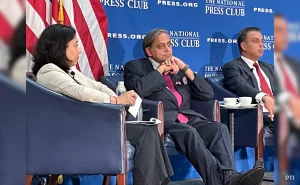

The contrast drawn by Shashi Tharoor on Pakistan highlighted the fundamental difference between India’s functioning multi-party democracy and Pakistan’s alleged support for terrorist activities. He argued that a flourishing democratic nation cannot be equated with a country that provides sanctuary to terrorist organizations.
This analysis by Shashi Tharoor on Pakistan emphasized that democratic values, rule of law, and commitment to international norms create a qualitative difference that makes traditional mediation approaches inappropriate and potentially counterproductive in addressing bilateral disputes.
American Role in Regional Dynamics
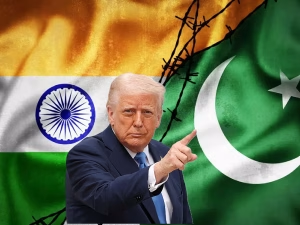
When discussing the American involvement in India-Pakistan relations, Shashi Tharoor on Pakistan provided insights into how the United States engages with both countries during periods of tension. He acknowledged that Washington maintains communication channels with both sides but emphasized that this engagement does not constitute mediation in the traditional sense.
The perspective offered by Shashi Tharoor on Pakistan suggested that American officials focus their persuasive efforts primarily on the side that needs to be convinced to cease aggressive actions. This approach recognizes the asymmetrical nature of conflicts and avoids the false equivalence that traditional mediation might imply.
Trump’s Mediation Claims
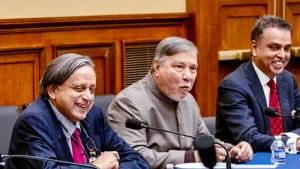

The analysis by Shashi Tharoor on Pakistan came in response to repeated claims by former US President Donald Trump regarding his role in mediating between India and Pakistan during recent tensions. Trump has claimed credit for helping broker a ceasefire between the two countries through direct diplomatic intervention.
However, Shashi Tharoor on Pakistan provided a different perspective on these events, suggesting that any American involvement was more about maintaining communication and expressing concern rather than formal mediation. He indicated that the resolution of conflicts came through direct military-to-military communication between the Directors General of Military Operations of both countries.
Operation Sindoor Context
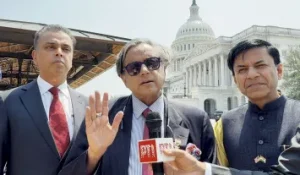

The remarks by Shashi Tharoor on Pakistan were made while he was leading a multi-party delegation discussing Operation Sindoor, which relates to India’s military response to terrorist attacks. This context provided additional weight to his analysis of why mediation approaches fail when dealing with terrorism-related conflicts.
The framework presented by Shashi Tharoor on Pakistan emphasized that when one party engages in or supports terrorist activities, traditional diplomatic solutions become inadequate and potentially dangerous as they may legitimize such behavior through the mediation process.
Geopolitical Arrangements and Stability
The comprehensive view expressed by Shashi Tharoor on Pakistan addressed the broader question of regional stability and established geopolitical arrangements. He argued that Pakistan’s revisionist approach threatens arrangements that have maintained relative stability for over three-quarters of a century.
This long-term perspective offered by Shashi Tharoor on Pakistan suggests that current tensions are not merely bilateral disputes but part of a larger challenge to established international order and regional stability mechanisms.
Final Word: Rejecting False Equivalence
The detailed analysis presented by Shashi Tharoor on Pakistan ultimately rejects the concept of false equivalence in international relations. His arguments demonstrate that effective diplomacy requires recognition of fundamental differences between parties rather than artificial assumptions of equality.
The position articulated by Shashi Tharoor on Pakistan reflects India’s broader foreign policy approach that emphasizes the importance of addressing root causes of conflicts, particularly terrorism and revisionist behavior, rather than seeking superficial mediation solutions that may inadvertently legitimize problematic actions and undermine long-term regional stability and security.

